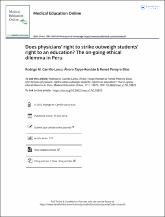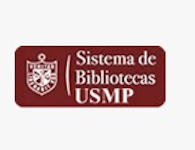Does physicians’ right to strike outweigh students’ right to an education? The on-going ethical dilemma in Peru

View/Open
Trabajo
(application/pdf: 269.3Kb)
(application/pdf: 269.3Kb)
Date
2012-12-19Author(s)
Carrillo-Larco, Rodrigo M.
Taype-Rondán, Álvaro
Pereyra-Elías, Reneé
Metadata
Show full item recordAbstract
Although often viewed as an action of last resort, going on strike remains a legal and often effective option for physicians seeking labor improvements and better working conditions. Indeed, in some countries, there have been reports of strikes by physicians 1 2, followed by ensuing discussions of potential ethical implications 3–5. However, little has been said about the consequences of such a mass labor stoppage on undergraduate medical education – and those students who aspire to the profession.
In Peru, physicians from the Peruvian National Social Insurance (EsSalud) went on a 33-day strike (August 7 to September 8), effectively limiting medical services to only emergency and critical care units. Furthermore, per EsSalud's labor guidelines (prepared for purposes of the strike), all academic activity within affiliated teaching hospitals was explicitly forbidden during the strike.
Collections
- Artículos [274]
Subject
Publisher
Taylor & Francis Group
Rights
info:eu-repo/semantics/openAccess







